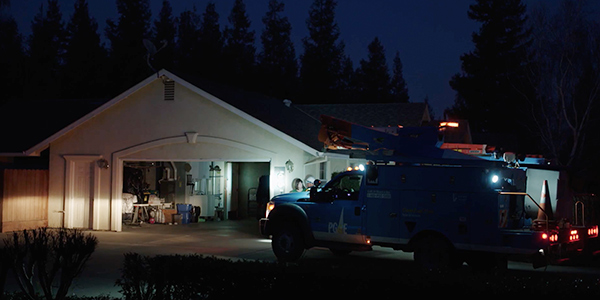Pacific Gas and Electric turned off power starting Monday night to nearly half a million residents two minutes after CAISO effectively ended its four-day blackout watch.
Strained capacity during a Western heat wave and lightning-sparked wildfires caused CAISO to issue blackout warnings over the long Labor Day weekend. (See CAISO Avoids Blackouts amid Brutal Heat, Fires.) High winds and the fear of utility-sparked wildfires drove PG&E’s intentional blackouts Monday night.
“Pacific Gas and Electric Co. has begun the process of power de-energization of numerous electrical lines as part of a public safety power shutoff [PSPS] due to severe weather conditions,” the utility said in a news release at 9:06 p.m.
The PSPS event affects 172,000 customers, or about 499,000 residents, in portions of 22 counties in the Sierra Nevada foothills, the Sacramento Valley and the northern San Francisco Bay Area.
At 9:04 p.m., CAISO relaxed its alert status, telling customers they no longer had to conserve power because of extreme heat and insufficient resources. The ISO declared Stage 2 emergencies Saturday and Sunday while warning it would call for rolling blackouts. It managed to avoid outages largely because of consumer conservation and help from neighboring utilities.
The heat wave that brought record temperatures to Los Angeles dissipated Monday as a high-pressure ridge gave way to offshore winds along the California coast and to cooler air flowing into the Western U.S. from Canada, the National Weather Service said.
By Tuesday morning, strong northeast winds were blowing across interior Northern California — the same conditions that spread catastrophic fires ignited by utility equipment during the past three fire seasons. NWS issued a red-flag warning through Wednesday morning based on low humidity and winds that it said would gust from 35 to 55 mph in the mountains and foothills of Northern California.
Dry vegetation and the rush of air from the north meant a “large portion of the Western U.S. will experience another day of critical to extreme fire weather conditions — meaning any ongoing fires or new starts could experience very dangerous fire behavior and spread,” the weather service said.
In Oregon, Portland General Electric instituted the state’s first PSPS on Monday as high winds buffeted the Mount Hood area east of Portland. About 5,000 customers were intentionally blacked out, while 100,000 Portland-area customers lost power as wind knocked down tree limbs and power lines. (See High Fire Danger Prompts First Oregon PSPS Event.)
Smoke from wildfires in eastern Oregon and throughout California continued pouring into urban areas, producing a noxious mix of wind-whipped smoke.
Southern California will feel the winds next, the weather service said. Santa Ana winds, notorious for spreading wildfires, will blow into the Los Angeles area through Wednesday night. NWS issued red-flag warnings until 8 p.m. Wednesday.
“Fuels, after this historic heat wave, will be at critical levels as we enter into the Santa Ana wind event,” NWS warned.
Southern California Edison said Tuesday afternoon it could shut off power to 55,000 customers in six counties to prevent wildfires, but it had not yet instituted a PSPS as of press time.




